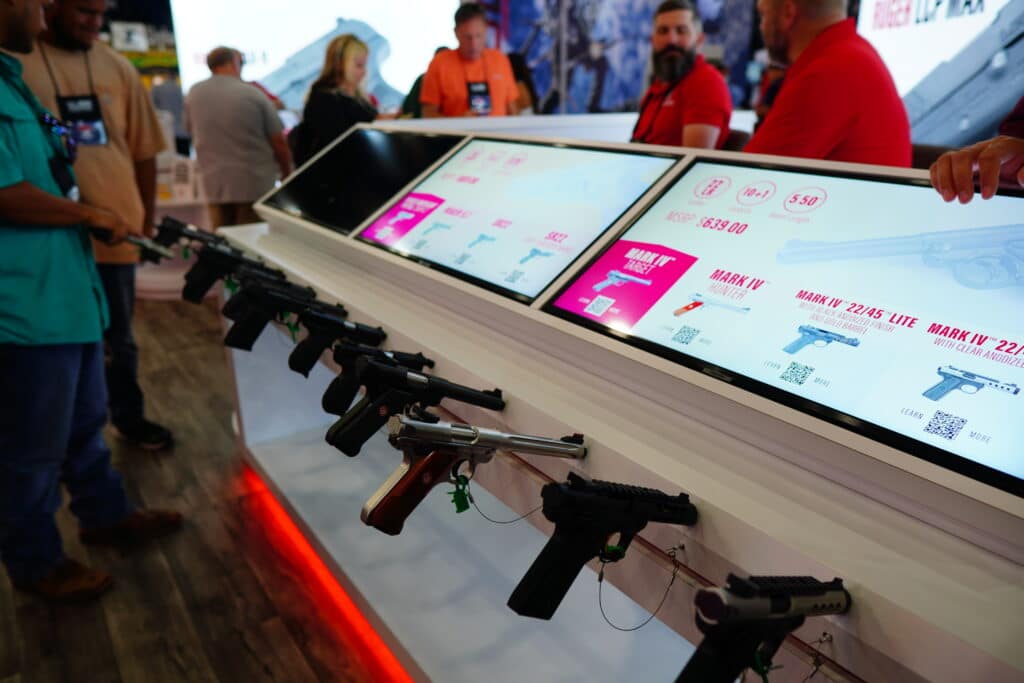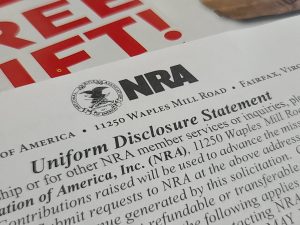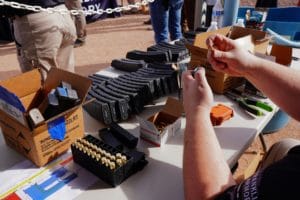How is your Thanksgiving weekend going?
Hopefully, you were able to slow down and spend some quality time with friends and family. Gun news is still moving quickly, though. So, we’ve tried to stay on top of it for you.
The recent high-profile mass shootings in Colorado and Virginia have dominated the headlines. Paired with the better-than-expected election performance by Democrats around most of the country, the focus on the horrendous attacks may well be changing the calculus on gun control.
Nowhere is that more likely to be the case than in Colorado. Contributing Writer Jake Fogleman examines the unique political landscape of the Centennial State to give us a preview of what new restrictions gun owners ought to expect.
At the same time, I look closer at Gallup’s latest poll. It shows a spike in gun ownership and a drop in support for stricter gun laws. How closely connected are those trends? Will they continue in the same direction? And will the latest mass shootings scramble how Americans think about guns?
Of course, I did want to give myself and our staff a bit of a break. So, we’re taking the week off from the podcast. We’ll have a new episode for you next week! If you have any guest suggestions or want to be on the show, just reply to this email and let me know.

Analysis: A Colorado Gun-Control Push is Coming [Member Exclusive]
By Jake Fogleman
Following a deadly week of multiple mass shootings, gun policy changes once seen as likely now seem inevitable.
Nowhere is that more true than in Colorado. Not only was the state the site of one of this past week’s high-profile shootings, but its political balance of power also provides ample opportunity for legislation to pass.
Over the past decade, Colorado has been one of only a handful of states where gun-control advocates have made serious legislative gains. Armed with that recent success and bolstered by unprecedented Democratic majorities in the state legislature thanks to this month’s midterms, gun-control advocates are moving full steam ahead with new proposals.
A group of 20 Democrats in the Colorado state house and state senate just announced the formation of a formal “Gun Violence Prevention Caucus” this week. The new caucus has already earned plaudits from gun-control groups like Giffords, and it will be headed by newly elected state senator Tom Sullivan (D.), who received more than $1 million in support from Everytown for Gun Safety during his campaign.
Members of the newly formed caucus have already begun floating some changes they would like to see in the wake of the Club Q shooting. Here’s a look at what will be on the table when the state assembly reconvenes in January.
Amending the State’s “Red Flag” Law
Perhaps more than anything else, expect to see renewed interest in the state’s “red flag” law. Colorado first passed Extreme Risk Protection Order (ERPO) legislation, commonly referred to as a “red flag” law, back in 2019. Tom Sullivan, who was then a state house member, was that bill’s prime sponsor. Currently, Colorado’s ERPO law allows only members of law enforcement or a person’s family/household members to petition a judge for the temporary removal of said person’s firearms if they’re deemed to pose a significant risk to themself or others.
Following the Club Q shooting in Colorado Springs, the state’s ERPO law immediately came under public scrutiny. That’s because the suspected shooter was arrested on multiple counts of kidnapping and felony menacing after threatening his mother and police with a homemade bomb and firearms, according to the Denver Gazette.
However, local officials never prosecuted the suspected shooter on those charges for reasons that remain unclear. Police records of the incident were subsequently sealed due to a recent Colorado law mandating that criminal records automatically seal when charges are dropped.
Even though the suspect would have been permanently barred from gun ownership had he been convicted of those charges, much of the public scrutiny has instead focused on why a “red flag” order was never filed against a person previously arrested for such unstable behavior. Neither the suspect’s mother nor law enforcement officials filed an ERPO petition following the incident, leading many Colorado lawmakers to determine that an expansion of the law is needed.
“Extreme Risk Protection Orders can save lives when utilized and we need to do more to ensure that these orders are used when needed to prevent self-harm and violent acts against others,” a spokesperson for Governor Jared Polis (D.) told Colorado Politics. “The Governor believes there is more to be done to improve utilization of this life-saving tool by law enforcement to prevent gun violence.”
Many proposed changes involve expanding education efforts surrounding the law to encourage the general public and law enforcement officials to use it more often. Others have proposed expanding the categories of people eligible to file an ERPO petition.
“It’s a very narrow group of people who can file a petition,” Tom Sullivan told the Denver Gazette.
Colorado could follow the lead of states like California, Hawaii, and New York, where employers, teachers, coworkers, and healthcare providers are allowed to file petitions.
Regardless of how far state lawmakers decide to go, expect to see significant efforts to expand the state’s ERPO law in the new year.
Raising the Age to Purchase an “Assault Weapon”
A bill raising the minimum age to purchase so-called assault weapons, including AR-15s and AK-47s, to 21 may also become law in the next legislative session.
Then-Representative Sullivan drafted a bill along those lines in the last session, but Democratic leadership decided to kill the effort to avoid a high-profile battle in an election year. Even in Colorado, legislation restricting popular rifles like the AR-15 risk drawing severe backlash from the state’s gun owners.
Nevertheless, it appears state lawmakers feel that this upcoming session will be the right time to introduce the contentious measure now that Democratic majorities are stronger than ever and a mass shooting involving an AR-15 is fresh on the public’s minds. That’s even though the suspect in the club Q shooting is 22 years old and thus would not have been affected by the proposed legislation.
Sullivan told The Denver Gazette that he was inclined to borrow the definition used by the city of Boulder in its assault weapon ban ordinance. That ordinance defines assault weapons as:
- All semi-automatic center-fire rifles that have the capacity to accept a detachable magazine and with certain additional characteristics;
- All semi-automatic center-fire pistols and with certain characteristics;
- All semi-automatic shotguns with certain characteristics;
- Any firearm which has been modified to be operable as an assault weapon; and,
- Any part or combination of parts designed or intended to convert a firearm into an assault weapon, including any combination of parts from which an assault weapon may be readily assembled if those parts are in the possession or under the control of the same person.
Unless Democratic leadership gets cold feet, it appears Colorado will follow Florida’s lead in raising the age to buy AR-15s and other similar rifles in the aftermath of the Parkland shooting.
“Ghost Gun” and “Assault Weapon” Bans
Total bans on so-called ghost guns and assault weapons are less likely than the policies mentioned above, but they can’t be ruled out entirely.
The probability of a statewide ban on homemade firearms coming to Colorado depends on the final results of the investigation into the Club Q shooting and the origin of the suspect’s guns. National media outlets, including CNN, have reported that the suspect obtained the firearms used in the attack through a traditional legal purchase. However, Colorado’s local NBC affiliate has reported that multiple sources have confirmed that both weapons used were unserialized “ghost guns.”
To date, restrictions on homemade guns have come entirely from local governments in deep blue enclaves within the state. The City of Denver banned unserialized firearms earlier this year, as did a handful of municipalities in Boulder County. However, at least one state senator has already expressed a desire to bring the issue to the state legislature. If it turns out that homemade weapons were used in the Colorado Springs shooting, expect to see others fall in line to support a statewide ban.
As for an outright ban on assault weapons, much will depend on how emboldened Colorado Democrats feel after this month’s election wins. The party already had trifecta control of state government as of 2018, and Colorado voters only boosted that control earlier this month. The party now has a veto-proof majority in the state house and is one seat away from the same in the state senate, its strongest majorities in the state’s history.
Colorado Democrats could interpret those historic margins as a mandate to swing for the fences on legislation this session, even for bills as controversial as assault weapon bans. The bans are already beginning to spread through municipalities across the state, notwithstanding the lawsuits they continue to draw.
However, the fact that age limits are the policy being publicly discussed at the moment–in the immediate aftermath of a mass shooting when public support for gun bans is at its highest–makes an outright ban less likely.
Nevertheless, even without a full AR-15 ban on the table, Colorado gun owners should brace themselves for a barrage of new restrictions. Between the formation of a first-of-its-kind gun-control caucus in the state legislature and more anemic-than-ever Republican opposition in the state, all signs are pointing to a big year for gun-control advocates.
It’s no longer a question of whether gun control will come up this session in Colorado or if it will pass. It’s now simply a question of how far the state’s advocates are willing to go.

Analysis: Will Support for Gun Control Continue to Sink as Gun Ownership Increases? [Member Exclusive]
By Stephen Gutowski
The latest polling shows a drop in support for stricter gun laws coinciding with a jump in gun ownership. But how strongly are those trends connected, and will they continue in the same direction?
Gallup released a poll on Monday that shows a nine-point decline in support for “more strict” gun laws. It also found 46 percent of Americans now report having a gun in their home or on their property, a decade-high.
Both of these outcomes are in line with expectations.
With two years of record gun sales and dealer surveys that indicate many of those sales were to first-time buyers, you’d expect a noticeable increase in the number of people telling pollsters they have a gun in their homes. The Associated Press first identified an increase to 46 percent of adults, or about 118 million Americans, earlier this year. And now Gallup is seeing the exact same thing.
With six months passing since the horrific killing spree at an elementary school in Uvalde, Texas, and a subsequent surge in support for new gun restrictions, you’d expect to see that support begin to wane. Past high-profile mass shootings have led to a cycle that starts with a sharp increase in gun-control support followed by a steep, but not complete, decline. And Gallup found that was the case this time as well.
A myriad of past polling has shown gun owners are significantly more opposed to tightening gun restrictions than non-gun owners. So, even though Gallup doesn’t break out the differences between the two groups in this poll, there is reason to believe some of the decrease in gun-control support is due to more gun owners. That’s especially true given the rise of new owners from demographics that have traditionally been more supportive of gun-control policies, including many women and minorities.
But there are also good reasons to believe the downturn in enthusiasm for stricter gun laws may not last long. For one, gun sales have slowed significantly since 2020. They remain higher than in the pre-pandemic era, but we’re no longer seeing millions of new gun owners minted each year. So, the effect on the country’s overall attitude toward guns will be more limited until sales jump again.
Additionally, Gallup’s poll was conducted in October. That’s before the recent spat of high-profile killings at the University of Virginia, Colorado Springs, and a Virginia Walmart. Those could cause a similar spike in support for new restrictions as Uvalde did, especially given how they happened in quick succession.
Beyond those two factors, the long history of Gallup’s polling on these questions provides insight into how connected they’ve traditionally been. And there hasn’t been a strong correlation there. In the early 1990s, when gun ownership hovered between 47 and 51 percent, support for stricter gun laws hovered between 67 and 78 percent. As gun ownership rates fell into the high thirties and low forties during the early 2000s, support for more gun restrictions didn’t increase. In fact, it decreased to between 50 and 60 percent.
By the 2010s, the two measures became fairly disconnected. As the number of Americans reporting a gun in their home stayed relatively stable, the number supporting stricter gun laws cratered. By 2011, only 43 percent wanted more restrictions, and more said they felt gun laws should be kept as they are. By the decade’s end, though, gun control grew more popular, peaking at 67 percent in 2018.
Perhaps things will be different this time. Maybe other polls will show a closer correlation between gun ownership and gun-control support. But Gallup is one of the only pollsters with results reaching back decades. And their results indicate the connection between gun ownership and gun politics isn’t as straightforward as it may seem.
That’s it for now.
I’ll talk to you all again soon.
Thanks,
Stephen Gutowski
Founder
The Reload





